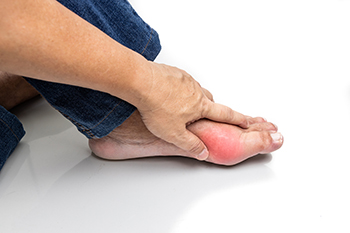
Gout, a form of inflammatory arthritis, can wreak havoc on foot health, causing intense pain, swelling, and stiffness. It often impacts the big toe first. It occurs when uric acid levels in the blood rise, leading to the formation of sharp urate crystals in the joints, often targeting the big toe joint. These crystals trigger sudden and severe bouts of pain, known as gout attacks, which can make walking and even wearing shoes unbearable. Managing gout involves dietary changes to help control uric acid levels. Foods rich in purines, such as red meat, organ meats, and shellfish, should be limited, as they can exacerbate gout symptoms. Conversely, incorporating plenty of fruits, vegetables, whole grains, and low-fat dairy products into the diet can help lower uric acid levels and reduce the frequency and severity of gout attacks. Staying hydrated by drinking plenty of water is also vital for flushing out uric acid from the body. If you have pain in your big toe and surrounding areas, it is suggested that you consult a podiatrist who can diagnose, treat, and offer additional nutritional tips to manage gout.
Gout is a painful condition that can be treated. If you are seeking treatment, contact one of our podiatrists from Centers for Foot & Ankle Care. Our doctors will treat your foot and ankle needs.
What Is Gout?
Gout is a form of arthritis that is characterized by sudden, severe attacks of pain, redness, and tenderness in the joints. The condition usually affects the joint at the base of the big toe. A gout attack can occur at any random time, such as the middle of the night while you are asleep.
Symptoms
- Intense Joint Pain - Usually around the large joint of your big toe, and it most severe within the first four to twelve hours
- Lingering Discomfort - Joint discomfort may last from a few days to a few weeks
- Inflammation and Redness -Affected joints may become swollen, tender, warm and red
- Limited Range of Motion - May experience a decrease in joint mobility
Risk Factors
- Genetics - If family members have gout, you’re more likely to have it
- Medications - Diuretic medications can raise uric acid levels
- Gender/Age - Gout is more common in men until the age of 60. It is believed that estrogen protects women until that point
- Diet - Eating red meat and shellfish increases your risk
- Alcohol - Having more than two alcoholic drinks per day increases your risk
- Obesity - Obese people are at a higher risk for gout
Prior to visiting your podiatrist to receive treatment for gout, there are a few things you should do beforehand. If you have gout you should write down your symptoms--including when they started and how often you experience them, important medical information you may have, and any questions you may have. Writing down these three things will help your podiatrist in assessing your specific situation so that he or she may provide the best route of treatment for you.
If you have any questions, please feel free to contact one of our offices located in Merrillville, Portage, Michigan City/LaPorte, and Schererville, IN . We offer the newest diagnostic and treatment technologies for all your foot care needs.
